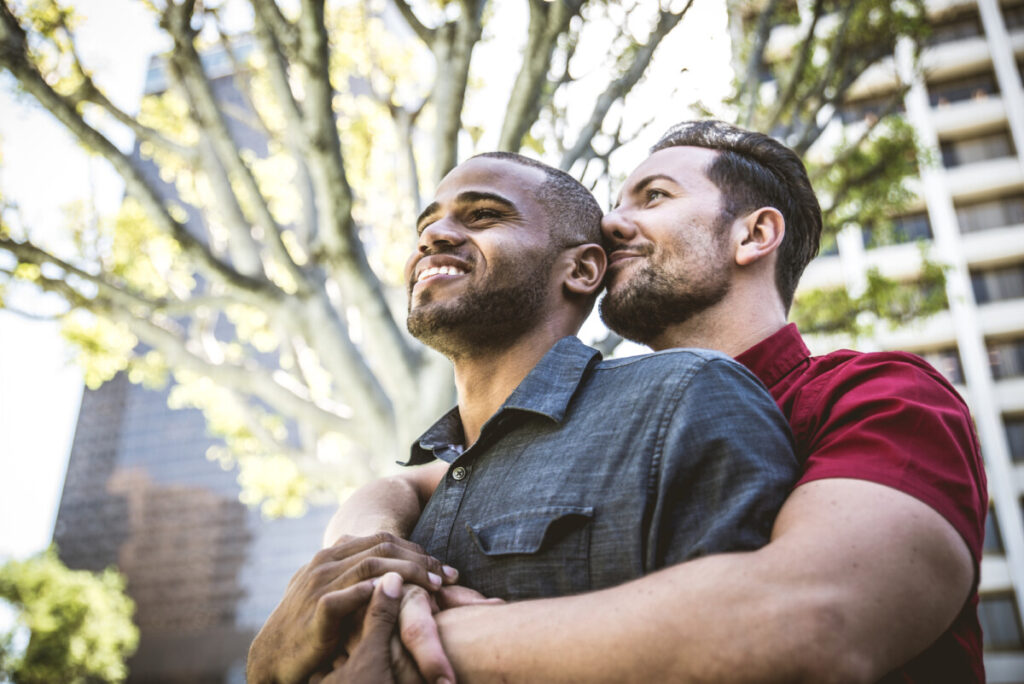 Gay Men’s Dating Situations That Are “No-Go” – And Their Alternatives – PART ONE
Gay Men’s Dating Situations That Are “No-Go” – And Their Alternatives – PART ONE
As a long-term (30 years in 2022) gay men’s specialist psychotherapist for individuals, couples, polycules, and AASECT Certified Sex Therapist (CST), I work with guys daily on relationships – finding them, improving them, and, in some cases, coping with ending them.
I hear a lot about that first one: finding them. It seems like for every gender and sexual identity, modern dating is just plain hard. But for gay men, we have that extra layer of challenge because often we didn’t “practice” dating in our teen years, so in our 20’s, or beyond, we’re still identifying and refining the skills of dating, with the special considerations for worldwide gay men’s culture.
Dating a new person can be thrilling, brimming with excitement, lust, laughter, and the warmth of companionship. For guys who don’t have this, I hear about the longing, yearning, hopes, fantasizing, and wishing that somebody good will come along, somehow. Guys want to be dating a good guy, but what happens if he’s really just not a good guy? You don’t need to strive for perfection, because every relationship requires work and compromise in the long term, but dating well requires learning and applying certain skills.
One of those skills is when to walk away. Dating situations can become untenable, and then it’s time to move on. I hear complaints from clients about when this happens, and while it’s a disappointment, it’s better to know about a potential partner’s “fatal flaw” now, rather than later.
In this two-part article, I will discuss 14 of the most common deal-breaker scenarios that can be discovered in early dating. For each of these, I offer some alternative suggestions for dating in the future:
- Racism – In today’s world, guys who are racist are not only “politically incorrect” but irksomely offensive, even if you’re a white guy and racist comments about people of color don’t apply directly to you. It still shows an aggressive, hostile thread in the guy’s personality to be just blanket “against” whole groups of people. It shows a lack of generosity of spirit that eventually will find its way to hurting you. It also shows a person who is not taking responsibility for his life, and tries to blame whole groups for his own frustrations, which is not living a self-empowered life.
In dating, it can take many subtle or insidious forms. The casual “joke.” Sometimes it’s talking about current events or politics and there’s just this hostile “attitude” toward certain groups. A guy complaining about a restaurant server, for example, might complain that they might be giving bad service, but then they “attach” a racial or ethnic remark to their complaint. Sometimes it’s the stories they tell, especially in groups of friends who are of similar mind, and you see a side to the guy in a group that you don’t see when you’re with him alone.
It’s awkward, and off-putting. He sounds more like a dude with a chip on his shoulder than someone who is really “evolved” into a classy guy you want to date.
Alternative: Look for guys who have an “easy-going” approach and reactions to many different kinds of people, and the “content” of their speech is free of bias complaints. Guys who don’t have a chip on their shoulder about “evil groups” of whoever. Guys who seem to have a diverse group of friends, maybe even by the names he mentions of people who sound like they are possibly ethnically diverse. If he plays poker Tuesday nights with Amir, Tyrone, Chi-Wai, Enrique, and Sameer, you’ve probably got a good one.
- Other Bigotry – We tend to think of offensive bigotry as being about Blacks or Latinos, but other forms of prejudice can emerge in speech and behavior in dating. Anti-Semitism, a general misogyny, internalized homophobia that criticizes seemingly all gay men except him, slut-shaming, classism/snobbery, ableism, and ageism are all subtle types of remarks that, again, don’t indicate an evolved soul.
Alternative: Look for guys who are confident and reasonably happy in their own skin as a gay man, and guys who for whom it just don’t seem to “occur” to them to make negative remarks about groups of people, or to say phrases that link negative traits to group characteristics or generalizations.
-
 Money Neurosis
Money Neurosis
While a bit more subtle, how you deal with money situations in dating can be significant. People in general can have a lot of neurosis about money, whether it’s more on the free-spending side of the spectrum, or the miserly side. Beliefs that we grow up with in our Family of Origin, and even some cultural issues, can influence sometimes strong feelings about money, which include entitlement, deprivation, vulnerability, personal values, and personal priorities about the value that we attach to things.
In dating, one red flag is finding that the guy does not reasonably share the cost of things, even if you know he works and makes an income where he could afford to split costs or alternate who pays what. Being happy to let you do all the paying shows a certain avoidance of responsibility or even an entitled expectation that goes beyond maybe someone who just makes a lower income. Watch for how he handles things when the dinner check comes, or when you’re buying movie or concert tickets, or if he offers to reimburse you in part for things that you bought for you together.
Another similar situation is sharing the cost of travel, like a weekend trip away, which might come after a month or so of dating. How you approach gas, or airline tickets, hotel costs, or meals might be an evaluation of sorts of generous versus how self-centered or miserly he is, which has big implications for the future of your relationship.
Alternative: Look for guys who appear generous and are somewhere in-between being a responsible, frugal adult, versus being financially irresponsible, which might come with the territory with ADD, for example, or someone who is excessively miserly, which might come from OCD or an anxiety about being insolvent or “financially impotent.” Look for guys who are reasonably big restaurant tippers, tipping a street musician, sharing costs with you on dates, but also having a financial planner who helps with his long-term savings planning his 401-k, especially after about age 30, when most guys should be handling their money like a grown-up.
-
 Unresolved Trauma – One thing that being a therapist has taught me about the world is just how much trauma there is, as I’ve written about before. Symptoms of PTSD can be bad enough for an individual to endure, but in the context of dating and relationships, it starts to affect everyone involved.
Unresolved Trauma – One thing that being a therapist has taught me about the world is just how much trauma there is, as I’ve written about before. Symptoms of PTSD can be bad enough for an individual to endure, but in the context of dating and relationships, it starts to affect everyone involved.
It’s not that you need to rule out from dating any guy who has a history of trauma; if you do that, you’re going to limit your dating pool significantly. But it’s a two-way street: You can learn to be compassionate and tolerate someone who shows some significant post-trauma symptoms, but you also get to expect that they are doing the best they can to help themselves and to even minimize the impact that their trauma history has on you. You can’t just go without sex indefinitely because the guy has a history of trauma from childhood sexual abuse; they should be working to reclaim their own self-empowerment, including their right to a healthy, robust, enjoyable sexuality, often in individual and/or group therapy.
Signs of unresolved trauma in dating might be an especially strong aversion to certain sexual acts, like being orally or anally penetrated, if his trauma was from a perpetrator who forced that on him. Other signs can be an unusually strong anger reaction that seems out of proportion to the stimulus, or demonstrating unusual fears and avoidance of certain places or situations. Issues when you feel like he’s not trusting you can be an after-effect of his trust being betrayed, especially by people close to him, like parents, teachers, or clergy. Having a trigger-response of irritability to any situation where he feels controlled or coerced is a sign. Even seeming to have “too much” or “too little” sex can be sign, but this one is especially nuanced, as natural libido levels can vary, which I wrote about here in a previous article on mismatched libidos in a relationship.
Alternative: Look for guys who either don’t have a traumatic history (which is kind of able-ist, actually), or, better yet, guys who have “been through stuff” but they practice the self-care to get the help they need, and guys whose emotional reactions generally “match” the situation or the conversation/situation at hand. If their behavior affects you, you might need to discuss the importance of him getting new, or better, help. It’s OK to ask him to take actions to reduce his trauma-reaction symptoms when they significantly affect you, such as a guy with night terrors disturbing your sleep. Emphasize that you want to be his ally in supporting his healing process from whatever he’s been through, but he’s the primary one who needs to access self-care.
-
 Psychiatric Neurosis
Psychiatric Neurosis
Previously, I wrote a three-part series of articles on how psychiatric personality disorders manifest in the workplace, because, as I said, “people with personality disorders get jobs.” Well, people with personality disorders date and form relationships, too. But unfortunately, one or both partners having a diagnosable psychiatric personality disorder can undermine that relationship’s success, even from early dating.
We all know their names, which are bandied about in social media seemingly constantly. The Narcissistic Personality Disorder, Borderline Personality Disorder, and Dependent Personality Disorder being among the most common that I hear about in dating complaints.
These are often, but not always, dating deal-breakers, because it is the nature of personality disorders to be persistent throughout the lifespan, and to extend to both personal and professional interpersonal encounters.
Guys who make everything “all about them” without showing curiosity or concern for you, and no empathy, are likely Narcissistic. Guys who get really irrationally angry if you don’t return their calls or texts right away, and they get the Borderline abandonment panic. Guys who are unattractively jealous, and “question” you on who you’re talking to, texting with, meeting with, etc. when they are platonic friends (but, also, don’t cheat if you have a monogamy agreement; if you don’t want to be monogamous, say so, and negotiate a Consensual Non-Monogamy agreement; I help guys with this often in my therapy and coaching work).
Guys who become “clingy” to you and can’t seem to tolerate being without you might have the Dependent Personality Disorder, and make you feel burdened to take care of them, even in the early days of dating, and seem to acquiesce to “whatever you want to do” very passively.
Other psychiatric conditions like adult ADD (Attention Deficit Disorder) or OCD (Obsessive-Compulsive Disorder, or, the related Obsessive-Compulsive Personality Disorder) can disrupt dating (my article on gay men’s relationships involving ADD is here, and the one involving OCD is here). (Full disclosure: I have a history of OCD myself in childhood, and OCPD as an adult, so, in my (now 20 years) relationship with my husband, we have had to have “negotiations” and compromises about that; he sometimes tolerates my vulnerability to needing things around the house in a certain order, but I also agree to talk myself down as well. It’s compromises like this, and communicating about them, which help to make a relationship with someone with a psychiatric disorder work.
Bipolar Disorder requires another set of compromises to ride the ups and downs of this condition, and Major Depressive Disorder requires adaptive coping for a partner who might have significant “down” periods (I hear about this, and work with it, a lot). Many very high-functioning guys (with big, demanding jobs) can still have major depression. It requires a delicate balance between giving them space and really “being there” to support them when they’re in that state. Medication helps the most with this.
Alternative: Look for guys who are probably in therapy, or have healthy mentoring relationships with others. The prevalence of psychiatric disabilities is just a fact of life in society, but look for guys who somehow have an “adaptive coping” strategy for any psychiatric challenges Nature sends their way. Look for guys who can “own” it, talk about it, make compromises with you about it, and strive to get the help they need to mitigate the disorder’s effects.
- Domestic Violence
This is the biggie. There is no condition that ruins relationships faster than domestic violence behavior (although an untreated drug or alcohol problem comes close). This when guys manipulate you into being isolated from friends and family, and then when they “got you where they want you” take control and do a number on your self-esteem and self-agency that can include somehow finding yourself tolerating physical acts like being slapped, shoved, punched, kicked, demeaned, humiliated, “outed”, or somehow emotionally or physically tortured. Serious stuff. And it happens with an alarming frequency.
When this happens – or even begins to happen – break it off, but also get counsel from a Domestic Violence program, especially one that’s friendly to gay men, because the abandonment rage of guys like this when you try to leave them can be the most dangerous/violent time of all.
Watch for warning signs like verbal statements like, “I don’t like that guy. I don’t think you should talk to him anymore.” Or, “She’s just always making trouble for us. If you really want there to be an ‘us’, then she’s gotta go.” Or, “Just trust me on this. We should do this my way because it always works out better than if you try to do it,” or, “Do you have to keep going there and doing that? I think you should give that up and spend more time home with me, where you really belong. That’s putting us first.”
Beware of him trying to keep you from seeing family or old friends who might notice any changes in your personality in becoming more dependent or unreasonably subservient to him.
Beware of insults or even back-handed compliments that control you, like: “You know, you’d be really hot if you finally lost that extra 20 pounds. You should really diet or work out more so you look good when you’re out with me. And I don’t like the longer haircut; get that buzzed off for me, will you? You look better when I guide you.”
If any of that sounds familiar, plan an exit strategy carefully and soon.,
Alternative: Avoid guys at the earliest, slightest indication of this kind of pathology. Pay attention to how your guy changes when he’s really angry. Listen for stories of previous “bar fights”, previous arrests, run-ins with law enforcement, even rumors from friends or exes. Be aware that the controlling behavior that predates actual domestic violence can be insidious and gradually encroaching. Challenge any sense of unreasonable “control” and watch for a bitter reaction when you assert your needs or desires. If you have seen your guy’s anger and he’s still reasonable, then you know you have a good one. Every partner is going to have anger, but there is that “line” that characterizes DV, and it sometimes stays hidden for quite a while (like after cohabitation, or even marriage).
In the second part of this article, I will discuss other “no-go” situations such as dishonesty, drug/alcohol problems, and the issue of whether to have kids. Stay tuned!
If you would like more specific help on your dating life, or any other aspect of gay men’s mental health, well-being, or life goals, consider therapy (for residents of California) or coaching (nationally, and worldwide). Having support for clarifying your values can help you present your best self to the dating pool, and even enjoy the process more. Call or text 310-339-5778, or email Ken@GayTherapyLA.com, for more information, or to make an appointment. And, please tell your friends about my blog (and podcast) if you think they could benefit from this material.

Ken Howard, LCSW, CST, is a Licensed Clinical Social Worker, AASECT Certified Sex Therapist, Life/Career/Relationship Coach, academic, activist, and LGBTQ+ advocate, with over 30 years experience as a gay men’s specialist. He also offers speaking engagements, and expert witness services on LGBT and HIV/AIDS issues. He is a Certified Psychiatric Social Worker, and has an additional Certification in Consensual Non-Monogamy and Polyamorous Relationships from the Sexual Health Alliance. He has been successfully living with HIV/AIDS since 1990. He lives in West Hollywood, California with his husband and pets.


 Money Neurosis
Money Neurosis Unresolved Trauma – One thing that being a therapist has taught me about the world is just how much trauma there is, as I’ve written about before. Symptoms of PTSD can be bad enough for an individual to endure, but in the context of dating and relationships, it starts to affect everyone involved.
Unresolved Trauma – One thing that being a therapist has taught me about the world is just how much trauma there is, as I’ve written about before. Symptoms of PTSD can be bad enough for an individual to endure, but in the context of dating and relationships, it starts to affect everyone involved. Psychiatric Neurosis
Psychiatric Neurosis